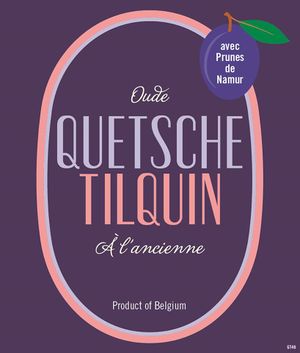Oude Quetsche Tilquin à l'Ancienne (Prunes de Namur): Difference between revisions
added 2016-2017 entry, will add the BB date later today. |
|||
| Line 35: | Line 35: | ||
|11/01/2026||2015-2016||375ml||"Avec Prunes de Namur" label||[[File:Tilquin_Quetsch_PdN_11Jan2016.jpg|30px|frameless]] | |11/01/2026||2015-2016||375ml||"Avec Prunes de Namur" label||[[File:Tilquin_Quetsch_PdN_11Jan2016.jpg|30px|frameless]] | ||
|- | |- | ||
| ||2016-2017||750ml||"Avec Prunes de Namur" label||- | |11/01/2027||2016-2017||750ml||"Avec Prunes de Namur" label||- | ||
|- | |- | ||
|}</center> | |}</center> | ||
Revision as of 01:48, 21 June 2018

Description
Oude Quetsche Tilquin à L'Ancienne avec Prunes de Namur is a lambic aged on Namur plums. One year old lambic made from are blended and aged with fresh, destoned, skin-on Namur plums for a period of 4 months. This concentrated, fruited lambic blend is then re-blended with 2 and 3 year old lambics to achieve a 250g/l concentration of fruit, before being bottle conditioned at the blendery for a minimum of 3 months.
Origins and Characteristics of the Namur Plum
Reportedly a direct descendant of the regular damson prune, or quetsche, the Prune de Namur was originally cultivated in Ancient Syria, and is believed to have been brought to Europe as early as the 1st Century. It isn't, however, until the 12th Century, at the time of the 2nd Crusade, that Namur plum trees are grouped into orchards and cultivated exclusively for their fruit.[1]
The plateaux and hillsides of Condroz and l'Entre-Sambre-et-Meuse soon become preferential for the Namur plum tree, where the altitude, climate and soil composition are favorable for its growth. At maturity, the quetschier will produce between 25 and 50kg of fruit per year, which is quite abundant. Visually, the plum itself is slightly smaller than a regular quetsche.
Gustatorily, the Namur plum also differs from the regular quetsche only slightly. According to Pierre Tilquin, the Quetsche véritable is more sweet, while the Prune de Namur is more sour. Pierre Tilquin described the differences between the two plum varieties in a post on Facebook: "They are very close, but the Quetsche véritable d'Alsace is a little bit more sweet than the Prune de Namur, which is a little bit more sour. The Prune de Namur is also a little bit smaller than the Quetsche véritable d'Alsace".[2]
History / Other Notes
The original experimental batch of Oude Quetsche Tilquin à l'Ancienne from the 2011-2012 season also used plums from Namur but was not labeled as such. This batch was also notably different in process as the fruit sat on the lambic for nearly six months (fruit added 8/30/2011 and removed 2/23/2012).
Oude Quetsche Tilquin à L'Ancienne avec Prunes de Namur Bottle Log
Label Log
References
- ↑ Maredret, La mémoire de notre village, Prune de Namur,
- ↑ Facebook, Quetsche Tilquin - batches 2014-2015 in progress, September 11, 2014
